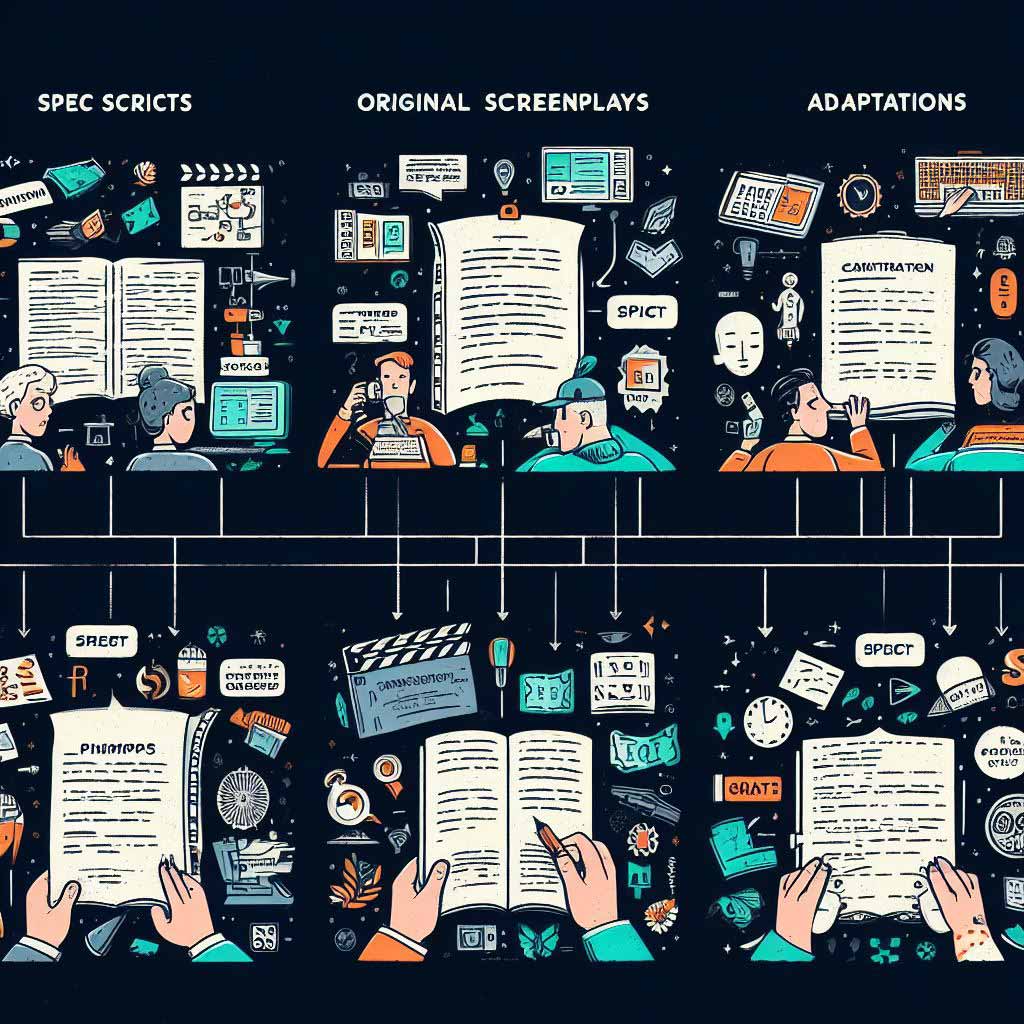For any aspiring screenwriter, the road to Hollywood success often seems long and daunting. As you scribble down ideas or stay up night after night writing your first masterpiece, that big question looms: how long will it actually take to sell your first script or establish a career in the competitive entertainment industry?
The truth is there is no set timeline or guarantee. Some writers catch their big break early, while others work for years or even decades before getting that dream phone call.
However, if you focus your energy in the right direction and commit to constantly improving your craft, you can dramatically shorten your path to becoming a professional screenwriter.
This comprehensive guide will walk you through realistic steps and timeframes to hone your skills, get exposure, and start selling your work. With hard work and perseverance, you can go from being an amateur writer to joining the coveted credits of a major film or TV production.
Learn the Craft of Screenwriting
When first starting out, it’s important not to think about selling scripts or breaking into Hollywood just yet. The first step is simply to learn the craft of screenwriting and hone your skills.
Becoming an excellent writer takes time and dedication. Expect the initial learning phase to take 1-2 years of consistent study and practice.
During this time, absorb as much knowledge as possible. Here are some key ways to develop your screenwriting abilities:
- Take Classes and Workshops: Enroll in screenwriting classes through local colleges or online programs to get formal training from industry veterans. Programs like UCLA Extension provide certificates. Also, look into paid multi-week workshops like those offered on ScreenCraft and Stage32.
- Read Screenwriting Books: Some essential reads include Save the Cat by Blake Snyder, Story by Robert McKee, and The Screenwriter’s Bible by David Trottier. Analyze scripts of popular movies in your genre as well.

- Write Daily: Just like playing an instrument, writing is a skill that requires daily repetition. Set a goal to write for at least an hour each day. Try creative exercises from books like The Writer’s Journey by Christopher Vogler.
- Study Script Format: Learn how to properly format your scripts. Resources like WriterDuet.

- Get Feedback: Share early drafts with experienced screenwriters who can provide constructive feedback to help shape and improve your writing.
Give yourself at least one year focused solely on writing every day, taking classes, reading, and surrounding yourself with others who are learning. By dedicating yourself fully to the craft, you’ll have the skills needed when it comes time to write your first viable screenplay.
Write Your First Feature Screenplay
Once you have a solid grasp of screenwriting basics, the next major step is writing your first full-length feature screenplay. This will likely take 6 months to a year to complete properly.
Rather than trying to write the next Oscar-winning drama right away, start with a more commercial, low-budget genre script for your first effort. Genres like comedy, horror, thriller, and sci-fi tend to sell easier as break-in projects for new writers.
Here are some tips for getting through your first screenplay:
- Pick a Concept: Outline a simple, high-concept story that can be told visually on a limited budget. Look at recent indie breakouts in your chosen genre for inspiration.
- Follow Screenplay Structure: Use a template like the hero’s journey or three-act structure to map out engaging plot points and character arcs.
- Write an Outline: Break down your story idea into a 15-25 page outline detailing the characters, settings, conflict, and major scenes.

- Set a Schedule: Establish a realistic timeline for finishing your draft, such as 3-4 months. Set daily word count goals and write at the same time each day.
- Avoid Distractions: Turn off your phone, close your email, and clear your calendar for uninterrupted writing time. The first draft is about getting the story down, not making it perfect.
- Use Screenwriting Software: Programs like FinalDraft, WriterDuet, or Fade In help properly format your script as you write. Use them from the start.
- Stay Motivated: Track your progress and celebrate milestones. Share excerpts with your writing group to get encouragement as you write.
- Get Feedback: After completing your first draft, get notes from experienced mentors through programs like The Black List or paid script consulting services. Use the feedback to polish your script through future drafts.
It takes dedication and sustained effort to craft 90 to 120 pages of material from your original concept. But finishing that first script is a huge accomplishment that will give you confidence in your skills.

Revise Your Work and Write More Scripts
Your first screenplay likely won’t be sold right away – or possibly ever. That’s okay at this stage. Now is the time for rewriting, improving, and adding more scripts to build out your body of work.
Expect to spend the next few years revising your first script based on the feedback received, as well as writing at least 3-5 more scripts. The goal is to hone your craft and have multiple completed projects ready to submit when opportunities arise.
Here are effective ways to keep advancing during this phase:
- Rewrite Your First Script: With notes in hand, dive into future drafts focused on fixing story issues, strengthening characters, and polishing the dialogue. Let it sit for a while between drafts for a fresh perspective.
- Write More Originals: Keep writing new scripts to flex different creative muscles and avoid getting stale. Try different genres and formats as you expand your portfolio.
- Consider Writing Spec Scripts: A spec script is written on speculation for an existing show as a writing sample. When starting out, these can demonstrate you can write in the tone and style of industry productions.
- Partner with a Writing Partner: Find a complementary writing partner through a writers’ group or class. Team up to brainstorm ideas, get feedback, and stay accountable.
- Join Writing Groups: Surround yourself with supportive peers through informal writing groups or paid mastermind cohorts. Meet in person or online to exchange scripts and connections.
- Enter Screenwriting Contests: Research respected contests you can submit your polished scripts for exposure, peer feedback, and cash prizes. Options include the Nicholl, Austin Film Festival, and Page Awards.
- Attend Industry Events: Look for screenplay pitch sessions and networking opportunities at local film festivals and conferences. Practice pitching your story and make authentic connections.
During these years, your primary focus should be on writing daily, rewriting often, connecting with the writing community, and continuing to learn. Absorb advice from those further along and be kind to yourself through the ups and downs.
Start Submitting Your Work
Once you have a solid first script and some additional projects ready to go, it’s time to start getting your work out there. Realistically, you will need to spend 1-2 years actively submitting scripts and making industry connections before securing representation or making that big script sale.
Use this time to develop a thick skin and get used to receiving rejections – it’s par for the course. Focus on volume and persistence. Here are some ways to start sending your work out:
- Query Managers and Agents: Research reputable managers and literary agents to query with your best script, logline, and pitch letter. Expect form rejections at first.
- Submit to Production Companies: Target smaller production companies accepting unsolicited submissions. Follow their guidelines closely and pitch your script’s commercial viability.
- Attend Pitch Festivals: Pay to pitch your script face-to-face to industry execs and producers at events like the Great American PitchFest or Pitch Week.

- Cold Call Producers: Look up contact info for working producers of indie films in your genre. Email them directly with a compelling, concise pitch of your script.
- Enter Screenplay Contests: Continue entering your best scripts into prestigious contests that get industry attention like the Nicholl Fellowship and Sundance Screenwriters Lab.
- Get a Recommendation: Leverage any connections you have, even if tenuous ones, to get referrals for your scripts. A personal recommendation goes further than a cold query.
- Consider Paid Leads: Research selective, vetted pay-for-access services like The Black List website or Coverfly that promise to elevate your scripts to industry members for a fee.
- Hire an Entertainment Lawyer: If you receive any interest for an option or sale, consult an entertainment lawyer to protect your rights and negotiate a fair deal.
During this submission phase, manage your expectations and be prepared for rejection after rejection. But with sustained effort and a marketing mindset, it’s possible to get your script in the right hands at the right time – which is all it takes to get that lucky break.
Persevere Through the Highs and Lows
If you haven’t secured representation or sold your first script after 2-3 years focused on actively promoting your work, don’t get discouraged. It often takes working writers 3-5 years or even longer to make that initial script sale.
Keep writing new material while continuing to submit your work, network, and improve upon any opportunities that come your way. Here are some key ways to persevere during the unpredictable ups and downs:
- Keep Writing: Don’t ever stop working on new scripts. Build up a diverse portfolio of samples and passion projects. Write every day if possible.
- Do Unpaid Gigs: Be open to doing free rewrites, script doctoring, editing work or internships for indie productions to build real-world experience and connections.
- Learn to Take Notes: Prepare to rewrite your scripts extensively as part of the development process once you get professional interest. Prioritize writing skills over ego.
- Build a following: As a writer, use Twitter, Instagram, TikTok, a blog, or other platforms to demonstrate your voice, knowledge, and grow an audience. This provides social proof for your work.
- Live Frugally: Have some savings or a flexible day job that allows you to keep writing. Be prepared for lean times and rejection streaks.
- Keep Networking: Nurture relationships with producers, managers, agents, or successful writers who can eventually help elevate your career. Don’t burn bridges.
- Stay Passionate: Keep your love for the craft strong through it all. Enroll in workshops, and classes or join writer groups to reconnect with your creative purpose.
With tenacity and a willingness to put in the hard work over an extended period of time, you can join the ranks of working Hollywood screenwriters. Don’t get impatient measuring your timeline against others. Stay focused on improving and persistence, and keep writing!
How Long Does It Take to Become a Screenwriter?
Of course, this entire process takes immense dedication, sacrifice, and perseverance. Some may shortcut parts of the path, while others encounter more obstacles that lengthen their journey. But for the vast majority of aspiring screenwriters, it realistically takes:
- 1 to 2 years to master screenwriting basics
- 6 months to a year to write your first feature screenplay
- 3+ years rewriting scripts, expanding your portfolio, workshopping, and building connections
- 2+ years actively submitting work before securing representation or making sales
That totals out to approximately 6 to 10 years of consistent effort to go from an amateur writer to a working professional screenwriter selling scripts and getting hired for assignments.

It’s essential to celebrate small victories during that long timeline. Finishing your first script, getting a personal rejection letter from an agent, making a quarterfinalist placement in a prestigious contest, or receiving your first paid gig polishing scenes – these are all mini milestones that inch you closer to success.
With hard work, perseverance, and a bit of luck, every aspiring screenwriter has the ability to eventually see their name proudly appear in the credits of a major film or television show. That journey starts with dedicating yourself fully to the craft of screenwriting and never giving up.
Frequently Asked Questions
Is it hard to become a screenwriter?
Yes, it is very hard to become a professional screenwriter. The industry is highly competitive and breaking in requires exceptional writing talent, persistence, luck, and the right connections. Most aspiring screenwriters spend years honing their craft before making any sales.
How long does it take to be a successful screenwriter?
It typically takes a minimum of 3-5 years of dedicated effort to go from an amateur writer to a working screenwriter selling scripts, but it can take 10 years or longer. Success is measured by selling specs, getting hired for assignments, or attaching talent to projects.
How long does it take to get a screenwriting degree?
A bachelor’s degree in screenwriting takes 4 years. A graduate degree like an MFA takes an additional 2-3 years. Academic programs teach writing skills but don’t guarantee Hollywood success.
How long should it take you to write a screenplay?
Experts recommend spending at least 3-6 months writing and rewriting a feature screenplay. High-quality scripts rarely get written in less than one month. Take the time needed to brainstorm, outline, write, get feedback, and refine.
Why do most screenwriters fail?
Common reasons for failure include lack of perseverance, poor writing skills, not targeting the market, weak networking/pitching skills, unrealistic expectations, and inability to take feedback. Screenwriting is the long game.
What age do most screenwriters start?
There is no ideal age to start screenwriting. Many take classes or begin writing in their 20s and 30s as a second career. While young prodigies exist, older writers can succeed with life experience.
Do screenwriters make millions?
Only top screenwriters make millions. Most earn the $30k-100k range for selling specs or doing rewrites/polishes early on. TV staff writers start around $50k. Advancing to A-list status takes many credits and hits.
What is the difference between a screenwriter and a scriptwriter?
A screenwriter specifically writes for film and TV. A scriptwriter is a more general term referring to anyone who writes scripts for any media format like radio, theatre, videos, or speeches.
What qualifications do you need to become a scriptwriter?
No formal qualifications are required, but a degree in screenwriting, film, or English helps. The most important qualities are creativity, storytelling skills, perseverance, networking abilities, and excellent writing skills.


